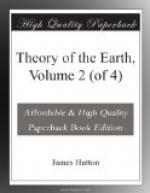If lakes are not in the natural constitution of the earth, when this is elevated from the sea into the place of land, they must be formed by some posterior operation, which may be now considered.
There are in nature, that is, in the natural operations of the globe, two ways by which a lake may properly be formed in a place where it had not before existed. One of these is the sliding or overshooting of a mountain or a rock, which, being undermined by the river, and pressed by its weight, may give way, and thus close up the defile through which the river had worn for itself a passage. The other is the operation of an earthquake, which may either sink a higher ground, or raise a lower, and thus produce a lake where none had been before. To which, indeed, may be added a third, the dissolution of saline or soluble earthy substances which had filled the place.
So many must have been those alterations upon the surface of the earth which we inhabit, and so short the period of history by which, from the experience of man, we have to judge, that we must be persuaded we see but little of those operations which make any sensible change upon the earth; and we should be cautious not to form a history of nature from our narrow views of things; views which comprehend so little of the effects of time, that they may be considered as nothing in the scale by which we are to calculate what has passed in the works of nature.
To form an idea of the quantity of the solid land which has been carried away from the surface of the earth, we must consider our land, with the view of a mineralist, as having all the soil and travelled materials removed, so as we might see the terminations of all the strata, where these are broken off and left abrupt. Now, the generality of those strata are declined from the horizontal plane in which they had been formed, and shew that the upper extremity had been broken off and carried away; and the quantity of that which has been carried away, since the time of the formation of those strata, so far as may be judged from the nature and situation of what remains, must be concluded as very great. This is best to be observed in mountainous countries, where not only the causes of this destruction of the land are more powerful, but the opportunities of investigating the effects more frequent, from the washing away of the loose soil or covering.




